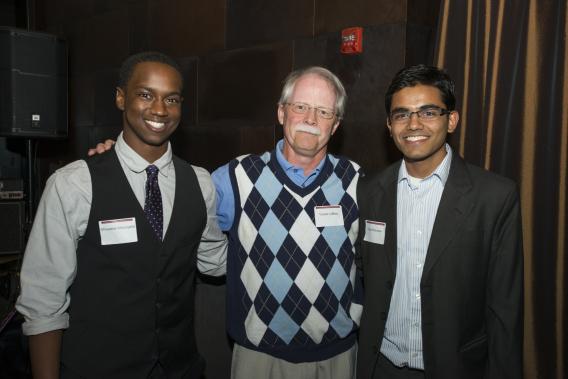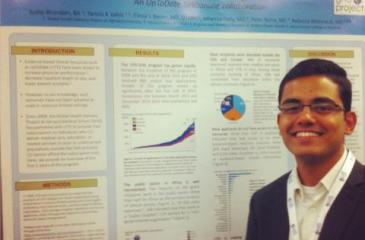When Sudip Bhandari began the CTSI Undergraduate Research Program (URP), he had an interest in public health research, but virtually no research experience.
Two years later and only one year out of college, he’s been published in a peer-reviewed journal, serves as a Global Health Corps fellow, holds a position at Harvard, and has been accepted to the University of Amsterdam on a Rotary International Grant.
“The Undergraduate Research Program was a springboard into my research career,” says Bhandari. “I gained a strong understanding of how to conduct public health studies, along with a mindset that’s focused on making a real-world impact with research.”
URP equips aspiring researchers like Bhandari with knowledge, skills, and experience in clinical, translational, and health equity research. To do this, the joint summer program of the Clinical and Translational Science Institute and the Center for Health Equity pairs scholars with a research mentor, provides funding and support for a research project, and offers a curriculum that includes weekly seminars covering translational science competencies and professional skill development, networking opportunities, and a final poster session with other CTSI scholar programs.
Bringing research skills into the real world
Today, Bhandari puts what he’s learned into practice at Harvard’s Global Health Delivery Project (GHD), which aims to address a critical global health delivery gap. As Bhandari explains:
“We know so much about how to treat and prevent diseases, but this information doesn’t consistently reach the people around the world who need it. My colleagues and I are trying to change that.”
GHD disseminates health knowledge through case studies, journal articles, panels, and online, professional communities at GHDonline.org. In his role as a community coordinator, Bhandari conducts research and helps manage the virtual communities by organizing online expert panels, fostering member engagement, and evaluating members’ feedback.
“Many of the skills I acquired through URP translate directly to the research dissemination work I’m doing now,” explains Bhandari. “For example, URP taught me how to make health research understandable to the general public, a skill I regularly use as I work to disseminate life-saving insights to people around the world.”
A consistent drive toward public health research
In addition to this stint at GHD, Bhandari has finished one global health fellowship, and is completing a second -- all within one year of getting his bachelor’s degree from St. Olaf College.
Shortly after graduation, he headed to Warsaw, Poland to research the country’s resistance movements as part of a human rights fellowship with Humanity in Action. And now he’s wrapping up his yearlong Global Health Corps fellowship, a program that enables young professionals to work on the frontlines of the fight for global health equity.
“I’ve had so many incredible, diverse experiences this past year,” acknowledges Bhandari. “The common thread is a concerted drive toward public health research, from developing the necessary skills to understanding the field’s most pressing issues.”
URP beginnings
Bhandari credits the CTSI Undergraduate Research Program for teaching him the foundations of research, which he’s been using and applying since he finished the program in 2013.
He developed many of these skills first-hand, while conducting a research project under the guidance of his URP mentor, Dr. Iris Borowsky, a faculty researcher with the University of Minnesota’s Department of Pediatrics.
With support from Dr. Borowsky, Bhandari analyzed survey data to examine the mental health characteristics of Minnesota 9th- through 12th-graders who carry guns to school.

“I joined URP knowing next to nothing about how to do public health research, but graduated with an incredible amount of knowledge and experience,” says Bhandari. “My URP mentor, Dr. Borowsky, taught me about so many aspects of public health research, from framing a research question to using statistical software to sharing findings.”
The summer program culminated with CTSI’s Poster Session & Reception, an annual event for all CTSI scholars that gave Bhandari his first-ever opportunity to present his research. A panel of judges deemed his poster to be one of two outstanding posters in his category, and awarded him funding to present at a national conference.
Reaping the rewards
Thanks to the travel award, he was able to present his URP project at the National Conference on Undergraduate Research (NCUR). A few months later, his research was published in the organization’s journal, NCUR Proceedings.
“Getting published in a peer-reviewed journal was an extremely satisfying moment, and one of the highlights of my URP experience,” says Bhandari. “Dr. Borowsky showed me the ins and outs of writing and revising a manuscript, so it was extremely valuable from an educational standpoint as well. I couldn’t have done this without my URP mentor’s support."
Building a research career
Bhandari aims to continue advancing his research career, with graduate school up next.
“One of the factors that attracts me to a graduate school is whether its faculty and students conduct research related to injury control, such as studies related to guns, accidents, and safety,” says Bhandari. “I first became interested in this very important issue while researching it as an URP scholar, and want to continue investigating it in the years ahead.”
This fall, Bhandari will head to the University of Amsterdam on a Rotary International Grant, to pursue a Master’s degree in Conflict Resolution and Governance. He’s also considering a second Master’s at Columbia (where he has also been accepted), getting his PhD, and eventually heading back to his native country of Nepal, to support public health issues there.
“The Undergraduate Research Program made me realize I wanted to pursue a career in research,” says Bhandari. “As a translational researcher, I hope to do my part in creating a healthier future for people in every corner of the world.”
